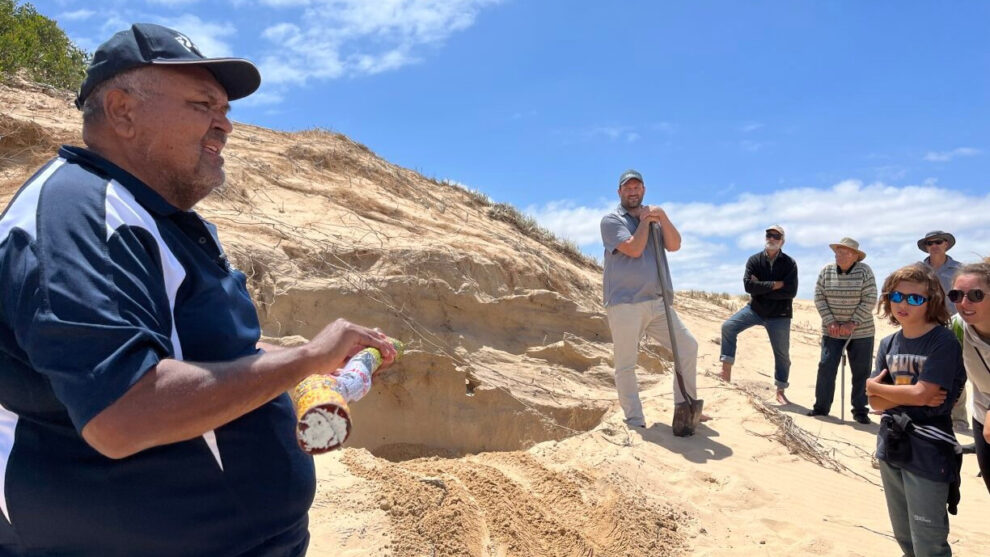A skull taken from a burial site on South Australia’s Murray Mouth more than 100 years ago has been returned to country in a traditional reburial site.
The remains were those of one of 11 ancestors recently repatriated from the Pitt Rivers Museum and Oxford Museum of Natural History in the UK and brought back to Australia by a group of elders including, Mark Koolmatrie.
Mr Koolmatrie was accompanied to the burial site by his brothers, Darryl and Colin, who are part of the Ngarrindjeri Aboriginal Corporation, as well as people onboard the Spirit of the Coorong tourist boat.
The remains were returned to a major burial site alongside three others on Ngarrindjeri country at Cattle Point.
Mr Koolmatrie said the event was surreal and joyful, but also sad.
“We’ll put them in a high area so they’ll be overlooking everybody,” he said.
Just before the remains were placed back in the sands of the Coorong, Mr Koolmatrie drank from the skull.
He told those watching that the skull had been used for this purpose by his people in the past, to bring strength and knowledge to those who drank from it, and showed that the ancestor had been someone of “high lore” within the community.
“The old person that we are bringing back left Ruwe, or country as we know it, around 130 years ago, and today is a very sad day in many respects, but it’s actually a joyous one,” he said.
A ‘personal privilege’
Joel Hirsch is the Spirit of the Coorong captain, and long time friend and colleague of Mark Koolmatrie, and was chosen to dig the hole where the remains were placed into.
“It was such a personal privilege for me just to dig the hole, to be a part of that,” he said.
“It just feels so wholesome.”
Mr Hirsch said the tourists on the boat that day had not known the reburial would be happening, but were also invited to join the traditional ceremony.
Nearly every one made the trek across the sand to witness the historic moment and many were visibly moved as they watched and listened.
“We’re just so thrilled to be able to be a part of it.”
Pukanu returns home
During the reburial on Wednesday, which included a smoking ceremony to bless everyone as they left the area, Mr Koolmatrie called the remains Pukanu, which means “grandfather” in his traditional language.
He spoke of picking up Pukanu from his temporary place at the South Australian Museum and talking to him as he brought him closer to the Coorong.
“I was saying, ‘Grandfather, I am taking you home’,” Mr Koolmatrie said.
“You must remember that grandfather has left this area and gone across the waters to be somewhere else — shifted, to be place to place to place.
“Came back on an aeroplane, sat in South Australian Museum.
“Pukanu did not know finally he was coming home after all of this time.”
More work to be done
Mr Koolmatrie asked attendees to keep the significance of what they had witnessed in their mind.
He said other ancestral remains in the UK, Europe and the United States still needed to be returned home
Mr Koolmatrie said he was also determined to see that the reburial of a “couple of thousand” more remains still held in the South Australian Museum and at Camp Coorong went ahead.
Source: NEWS











